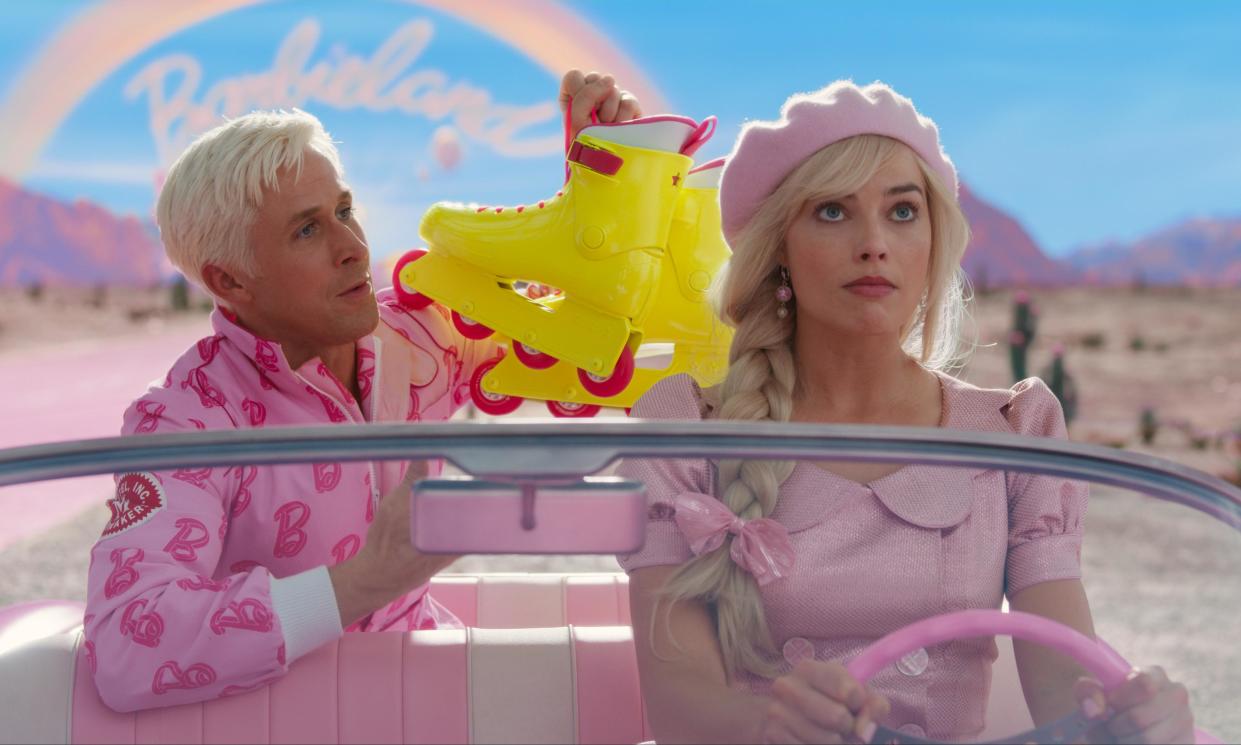Barbie review – Ryan Gosling is plastic fantastic in ragged doll comedy

Are Barbie dolls demeaning or empowering? Director Greta Gerwig and her co-writer Noah Baumbach opt for the latter theory in this beamingly affectionate and deliriously pink-themed fantasy comedy-adventure produced by Barbie’s corporate manufacturer Mattel, and starring Margot Robbie whose own superhuman blond beauty makes her the only possible casting as Barbie herself. It is maybe down to Gerwig’s confidence and generosity as a feminist film-maker that she gives all the best lines to Ryan Gosling, who is allowed to steal the whole film playing Barbie’s non-genitaled boyfriend, Ken.
Yet the film has to keep second-guessing and pre-empting the anti-Barbie impulse with a stream of knowing references and self-aware meta-gags, which acknowledge that, sure, yes, Barbie’s uber-blond-slim persona is arguably conformist and oppressive, but we know all that, we’re past all that; these charges are redeemed by Barbie’s ethereal innocence and there is in any case now a range of Barbies, diverse in terms of ethnicity and body-image – among whom Robbie is first among equals as Stereotypical Barbie – including a wheelchair-using Barbie. But even this is hedged with a quirky admission that the real world that imposed these changes is still itself imperfect and tokenist.
The result is a good-natured but self-conscious movie, whose comedy is rooted in that very self-consciousness, often funny, occasionally very funny, but sometimes also somehow demure and inhibited, as if the urge to be funny can only be mean and satirical. And so often Barbie winds up playing the bland comic foil to comic characters like the outrageous metrosexual Ken, obsessed with his “beach” habitat and longing for the patriarchy, and to Weird Barbie, the Barbie who has been abusively over-played-with and crayoned-over, always dishevelled on the floor doing the splits, played here by Kate McKinnon.
Related: ‘It had to be totally bananas’: Greta Gerwig on bringing Barbie to life
Barbie herself is living her best life in her perfect Barbie world, partying of an evening with Barbies who are political leaders, supreme court judges and Nobel laureates (including Dua Lipa and Issa Rae), and a castrato chorus of beach-bunny Ken clones (including John Cena and Simu Liu) and Ken’s gloomy beta-male mate Allan (Michael Cera) when suddenly she is assailed with the terrible thought of dying.
Weird Barbie tells her she must journey to the real world outside to sort this out and so she and Ken arrive in scuzzy Santa Monica in time-honoured fish-out-of-water style to discover that this existential anxiety has been psycho-cosmically transmitted to her from Gloria, a former Barbie owner, now a hardworking single mom who is an assistant in the Mattel empire: a nice performance from America Ferrera. Gloria has a whip-smart, discontented teen daughter Sasha (Ariana Greenblatt) and those squeamish about spoilers or disloyalty might want to look away before the revelation that Sasha starts out fiercely and boldly critical of Barbie before being tamely converted. It is with this conversion that politics is definitively banished.
Ken is thrilled by male dominance in this real world and tries replicating it back in Barbieland, to Barbie’s dismay. Will Ferrell plays the Mattel CEO and chair of the all-male board and Rhea Perlman has a cameo as Ruth Handler, the creator of Barbie who reportedly named the doll after her daughter Barbara. (The movie does not acknowledge the alternative theory, that Barbie was named after Barbara Ryan, wife of Mattel’s chief designer Jack Ryan whose life-story gives us an actual #Barbenheimer connection: before designing Barbie for Mattel, he designed missiles for the Pentagon as an employee of aerospace giant Raytheon, an important player in the postwar military-industrial complex.)
This movie is perhaps a giant two-hour commercial for a product, although no more so than The Lego Movie, yet Barbie doesn’t go for the comedy jugular anywhere near as gleefully as that. In interviews about Barbie, Gerwig has referenced Milton and Powell and Pressburger: judging from this, I would say the influences are Toy Story, Pinocchio and Clueless. It’s entertaining and amiable, but with a softcore pulling of punches: lightly ironised, celebratory nostalgia for a toy that still exists right now.
• Barbie is released on 20 July in Australia, and on 21 July in the US and UK.

 Yahoo Movies
Yahoo Movies 
